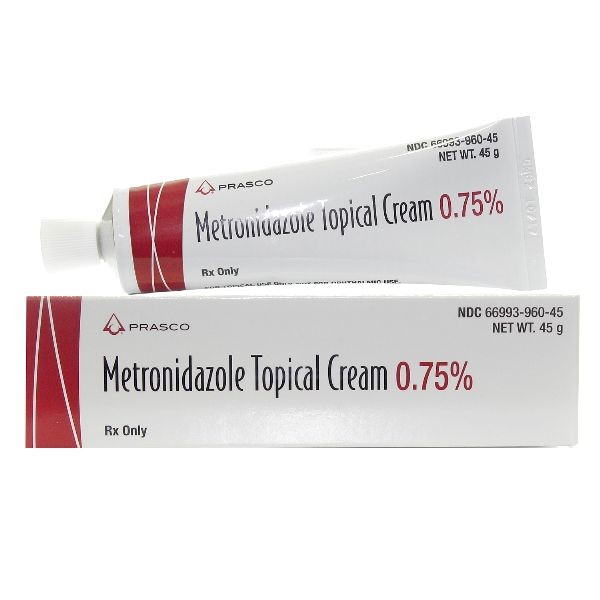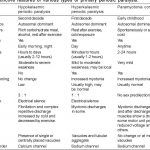
Metrogel (metronidazole) Side Effects, Warnings, and Interactions
Metrogel, Metrocream, and Metrogel Vaginal (metronidazole topical) is an antibiotic effective against anaerobic bacteria and certain parasites. Metrogel and Metrocream are used for treating rosacea, while Metrogel Vaginal is used to treat bacterial vaginosis. It is not effective against Candidal vaginosis ("yeast infection"). Common side effects of Metrogel include:
- skin irritation and dryness
- allergic contact dermatitis
- skin burning and stinging
- allergic reaction
- candida vaginitis during or shortly after therapy
- vaginal vulvar itching
- gastrointestinal cramps or pain
- nausea
- metallic taste
Other important side effects of Metrogel include bloating, dark urine, depression, and skin rash.
There are no adequate studies of Metrogel use in pregnant women. Orally administered metronidazole is secreted in human milk in concentrations similar to concentrations in the mother’s blood. Although metronidazole concentration in blood after vaginal or topical administration is small, potential effects on the infant should be considered.
What are the important side effects of Metrogel (metronidazole topical)?
Common side effects:
- Skin irritation
- Skin dryness
- Allergic contact dermatitis
- Burning and stinging
- Allergic reaction
- Candida vaginitis during or shortly after therapy
- Vaginal vulvar itching
- Gastrointestinal cramps or pain
- Nausea
- Metallic taste
Other important side effects include:
Disulfiram reactions when used with alcohol. Disulfiram reaction is associated with signs and symptoms of severe flushing that may be accompanied by tachycardia and low blood pressure (hypotension).
Metrogel (metronidazole) side effects list for healthcare professionals
Clinical Studies Experience
Because clinical trials are conducted under widely varying conditions, adverse reaction rates observed in the clinical trials of a drug cannot be directly compared to rates in the clinical trials of another drug and may not reflect the rates observed in practice.
In a controlled clinical trial, 557 patients used metronidazole gel, 1% and 189 patients used the gel vehicle once daily for up to 10 weeks. The following table summarizes selected adverse reactions that occurred at a rate of ≥ 1%:
| Patients with at least one AE Number (%) of Patients |
186 (33.4) | 51 (27.0) |
| Infections and infestations | 76 (13.6) | 28 (14.8) |
| Bronchitis | 6 (1.1) | 3 (1.6) |
| Influenza | 8 (1.4) | 1 (0.5) |
| Nasopharyngitis | 17 (3.1) | 8 (4.2) |
| Sinusitis | 8 (1.4) | 3 (1.6) |
| Upper respiratory tract infection | 14 (2.5) | 4 (2.1) |
| Urinary tract infection | 6 (1.1) | 1 (0.5) |
| Vaginal mycosis | 1 (0.2) | 2 (1.1) |
| Musculoskeletal and connective tissue disorders | 19 (3.4) | 5 (2.6) |
| Back pain | 3 (0.5) | 2 (1.1) |
| Neoplasms | 4 (0.7) | 2 (1.1) |
| Basal cell carcinoma | 1 (0.2) | 2 (1.1) |
| Nervous system disorders | 18 (3.2) | 3 (1.6) |
| Headache | 12 (2.2) | 1 (0.5) |
| Respiratory, thoracic and mediastinal disorders | 22 (3.9) | 5 (2.6) |
| Nasal congestion | 6 (1.1) | 3 (1.6) |
| Skin and subcutaneous tissue disorders | 36 (6.5) | 12 (6.3) |
| Contact dermatitis | 7 (1.3) | 1 (0.5) |
| Dry skin | 6 (1.1) | 3 (1.6) |
| Vascular disorders | 8 (1.4) | 1 (0.5) |
| Hypertension | 6 (1.1) | 1 (0.5) |
| Dryness | 138 (25.4) | 63 (34.2) |
| Mild | 93 (17.1) | 41 (22.3) |
| Moderate | 42 (7.7) | 20 (10.9) |
| Severe | 3 (0.6) | 2 (1.1) |
| Scaling | 134 (24.6) | 60 (32.6) |
| Mild | 88 (16.2) | 32 (17.4) |
| Moderate | 43 (7.9) | 27 (14.7) |
| Severe | 3 (0.6) | 1 (0.5) |
| Pruritus | 86 (15.8) | 35 (19.0) |
| Mild | 53 (9.7) | 21 (11.4) |
| Moderate | 27 (5.0) | 13 (7.1) |
| Severe | 6 (1.1) | 1 (0.5) |
| Stinging/burning | 56 (10.3) | 28 (15.2) |
| Mild | 39 (7.2) | 18 (9.8) |
| Moderate | 7 (1.3) | 9 (4.9) |
| Severe | 10 (1.8) | 1 (0.5) |
The following additional adverse experiences have been reported with the topical use of metronidazole: skin irritation, transient redness, metallic taste, tingling or numbness of extremities, and nausea.
Post Marketing Experience
The following adverse reaction has been identified during post approval use of topical metronidazole: peripheral neuropathy. Because this reaction is reported voluntarily from a population of uncertain size, it is not always possible to reliably estimate the frequency or establish a causal relationship to drug exposure.
What drugs interact with Metrogel (metronidazole)?
Oral metronidazole has been reported to potentiate the anticoagulant effect of coumarin and warfarin, resulting in a prolongation of prothrombin time. Drug interactions should be kept in mind when Metrogel (metronidazole) is prescribed for patients who are receiving anticoagulant treatment, although they are less likely to occur with topical metronidazole administration because of low absorption.
Summary
Metrogel, Metrocream, and Metrogel Vaginal (metronidazole topical) is an antibiotic effective against anaerobic bacteria and certain parasites. Metrogel and Metrocream are used for treating rosacea, while Metrogel Vaginal is used to treat bacterial vaginosis.


